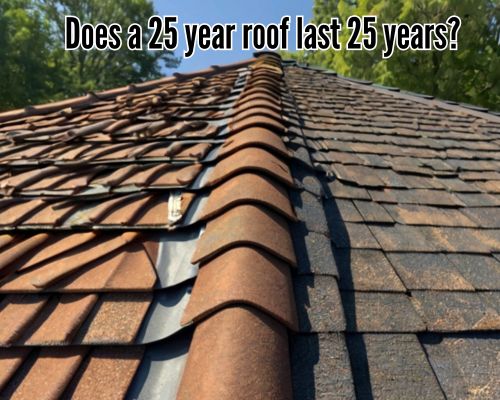If you live in New Jersey, USA, and you’ve ever glanced up at your shingles wondering, “Will this 25-year roof really last that long?”, you’re not alone. It’s a question that haunts homeowners, roofing contractors, and real estate pros alike. Spoiler alert: The answer isn’t as black-and-white as the warranty on your roofing materials.

With Charles Jimerson of CJ Commercial Roofing NJ, we’ll dive deep into what a “25-year roof” really means, how New Jersey’s weather affects roof longevity, and expert tips to help your roof hit—or even surpass—that quarter-century mark. Plus, we’ll cover salient entities like roofing materials, local contractors, and maintenance strategies to make this your definitive SEO guide on the topic.
What Does “25 Year Roof” Actually Mean?
First things first, “25-year roof” is primarily a marketing term tied to the warranty on certain roofing materials, mostly asphalt shingles. But here’s the kicker: the warranty period and actual lifespan are not always perfectly aligned.
- Manufacturers’ Warranty: This is the period during which the manufacturer promises to cover defects, often excluding damage from weather or wear and tear.
- Expected Lifespan: This can vary widely depending on materials, installation quality, and environmental factors.
In New Jersey, a “25-year” asphalt shingle roof typically means the shingles are rated to last approximately 20-30 years under average conditions. But real-world factors often change that timeline.
Why New Jersey’s Climate Matters for Roof Longevity
New Jersey’s climate is famously variable—hot, humid summers, cold winters with ice and snow, and the occasional nor’easter whipping through. This variety puts roofing materials through a rollercoaster of stress. Here’s how it affects your 25-year roof:
- Winter Freeze-Thaw Cycles: Water seeps into small cracks or under shingles, then freezes and expands, potentially causing damage.
- Summer Heat & UV Exposure: Prolonged sun exposure can cause shingles to dry out and crack.
- Heavy Rain & Nor’easters: Excessive moisture can lead to roof leaks and damage to the underlayment.
- Salt Air in Coastal Areas: For New Jersey homes near the shore, salt corrosion can degrade roofing materials faster.
All these factors mean that even a quality 25-year shingle roof might not hit the full lifespan without proactive maintenance.
Key Roofing Materials Rated for 25 Years
In the New Jersey roofing market, a “25-year roof” usually points to:
- Asphalt Shingles: The most common and cost-effective option, popular for residential homes across Bergen, Essex, and Middlesex counties.
- Architectural (Dimensional) Shingles: A premium asphalt shingle type with better durability and a typical lifespan of 25-30 years.
- Metal Roofing (Some Styles): While metal roofs often last longer, some coatings or lower-grade metals may have warranties around 25 years.
Knowing your materials is crucial. Asphalt shingles are generally less durable than metal or slate, but with proper care, they can still make the 25-year mark in New Jersey.
How to Make Your 25-Year Roof Last 25 Years in New Jersey
Surpassing the expected lifespan of your roof isn’t just about luck. Here are expert strategies to optimize roof longevity:
1. Hire Licensed New Jersey Roofing Contractors
Installation quality is king. Hiring a reputable, licensed roofing contractor in New Jersey who knows local building codes and climate challenges can prevent costly mistakes. Counties like Monmouth and Hudson have a competitive market of skilled roofers—do your research!
2. Regular Roof Inspections and Maintenance
New Jersey’s climate demands routine inspections, especially after harsh winters or storms. Look for:
- Missing or curling shingles
- Damaged flashing around chimneys and vents
- Clogged gutters that cause water backup
- Signs of moss or algae growth, especially in shaded areas
Scheduling biannual roof checks—spring and fall—helps catch problems early.
3. Proper Attic Ventilation and Insulation
In New Jersey’s humid summers and freezing winters, your attic’s ventilation impacts roof temperature and moisture buildup, affecting shingle integrity. Ensure your attic is well-ventilated to prevent premature roof aging.
4. Prompt Repairs to Prevent Small Issues Becoming Big Problems
Don’t ignore minor leaks or damaged shingles. Small water damage can escalate quickly, leading to structural issues and expensive repairs.
Signs Your 25-Year Roof Might Be Nearing the End
Even with great care, time takes its toll. Watch for these red flags in your New Jersey home:
- Granule Loss: Check gutters for excessive shingle granules, which protect against UV damage.
- Cracking or Curling Shingles: Indicates drying out or wind damage.
- Roof Sagging or Warping: Suggests structural issues needing immediate attention.
- Increased Energy Bills: Could mean your roof’s insulation is compromised.
If you spot these, it might be time for a roof replacement, and New Jersey homeowners have plenty of options—like architectural shingles or metal roofing—to upgrade durability.
Local Roofing Regulations and Incentives in New Jersey
New Jersey encourages energy efficiency and storm resilience. Many local municipalities offer incentives or rebates for installing cool roofs, energy-efficient shingles, or hail-resistant materials—especially relevant in areas like Jersey City or Newark, prone to urban heat islands and severe weather.
Always check with your local township building department for roofing permits and guidelines before starting any major roof work.
Conclusion: Does a 25 Year Roof Last 25 Years in New Jersey?
Here’s the nutshell: A “25-year roof” can last 25 years—but only if you combine quality materials, expert installation, climate-aware maintenance, and timely repairs. New Jersey’s challenging weather makes this a realistic goal, but not a guarantee.
By understanding your roofing materials, local weather impacts, and investing in professional care, your roof can protect your home for decades—whether you’re in Paterson, Princeton, or Cape May.
Bonus: Finding Trusted Roofers Near You in New Jersey
For homeowners in New Jersey searching for reliable roofing experts, consider these tips:
- Check local reviews and Better Business Bureau ratings.
- Ask for proof of insurance and NJ contractor licenses.
- Get multiple quotes with detailed scopes of work.
- Look for contractors familiar with 25-year warranty products and New Jersey weather challenges.
